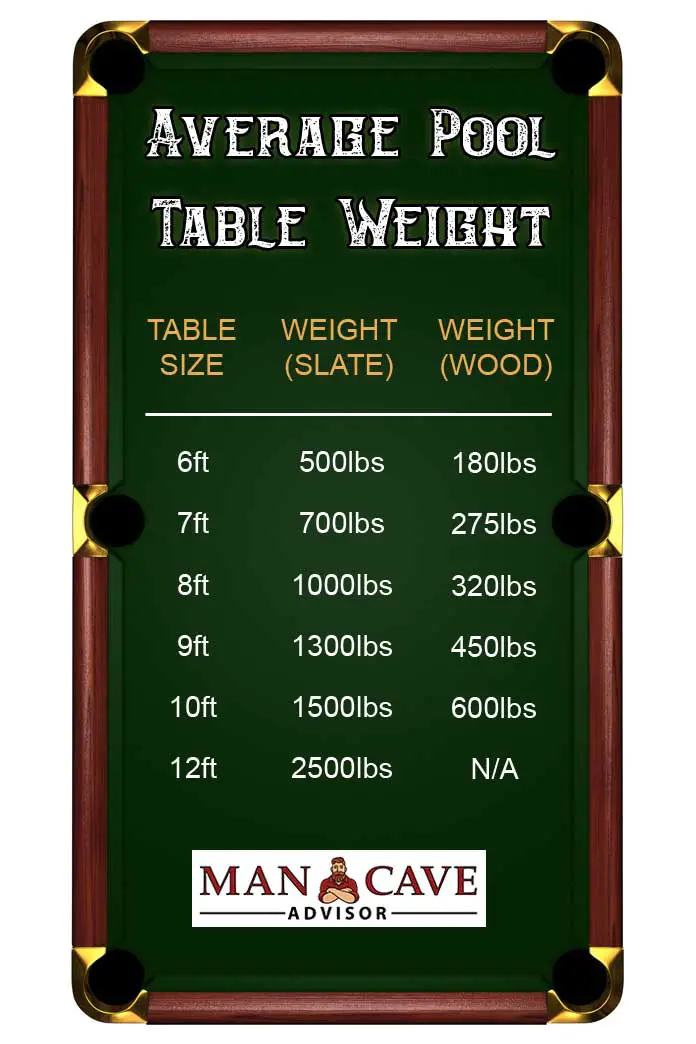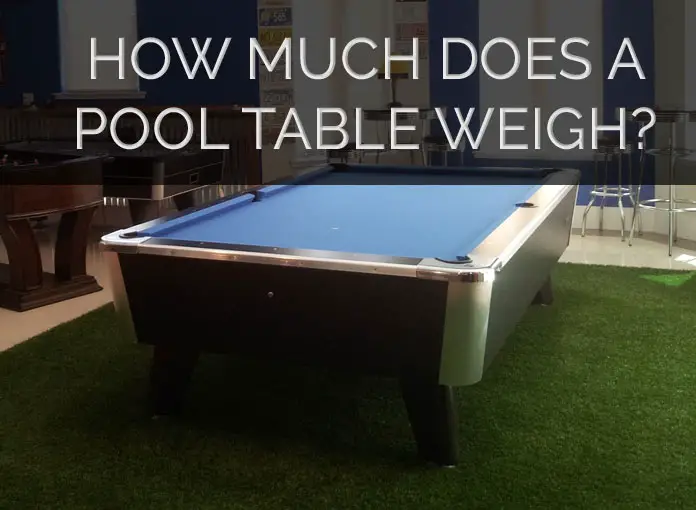If you’re planning on adding a pool table to your man cave, it’s imperative that you first understand how much it weighs. Flooring finishes – especially in a man cave that was constructed DIY style – may not be able to sustain the weight of a full-sized pool table without incurring some sort of damage. On top of that, there’s the issue of moving your pool table around in case you decide to do some redesigning.
The weight for a pool table can vary greatly. In general, the average weight of a small 6ft wood (MDF) pool table is 180 pounds (80 kilos) all the way up to 600 pounds (270 kilos) for a 10ft wood table. Slate pool tables on the other hand are much heavier because of the hefty slate bases. These start at 500 pounds (225 kilos) for a small 6ft slate pool table right up to 2500 pounds (1130 kilos) for 12ft 1” thick slate tournament table.
Tournament tables that use 2” slate can be even heavier.
Pool Table Sizes and Their Corresponding Weights
The size of your pool table will significantly impact its weight. Pool tables come in a range of sizes for a variety of play types, so it’s important that you first determine how you want to use your table to determine the ideal size for your space.
- Bar Pool Tables – A regulation standard sized bar pool table should be 88 inches long and 44 inches wide. These can weigh anywhere from 250 to 700 pounds.
- Home Pool Tables – Used for casual pool play, home table sizes don’t follow a specific standard. But they will typically range from 42 to 48 inches wide, and 84 to 96 inches long. Depending on what they’re made of, these tables can range from 300 to 1,000 lbs.
- Tournament Pool Tables – These are the largest type of pool tables, and will measure around 54 inches wide and 108 inches long. Unlike home tables, tables designed for tournament use should use a minimum of 3 slate tops, making them much heavier than other tables.
Usually, the lightest tournament tables that use standard materials will be around 1,200 lbs. The weights only get heavier from there. Non-regulation pool tables that meet the size requirements for tournament tables can be lighter, especially if they use materials like wooden sheets.
Keep in mind that there are a number of factors that can impact the weight of a pool table. Things such as build quality, make and material, and added features like automatic ball dispensing machines are just some of the things that could easily compound the weight of a pool table.
Slate vs Wood and Other Pool Table Materials
Pool tables can be made from a variety of materials. These won’t only have an impact on the quality of your experience, but the weight and durability of your table as well.
Mostly, you’ll find that majority of pool tables will use slate – a natural, stone-like material that’s easy to flatten out and polish. Larger tables will use more slate, and will thus weigh significantly more.
For reference, the Brunswick Gold Crown VI tournament sized pool table uses three 1” slate and weighs roughly 1,221 lbs. Some tables use thicker slate slabs to provide more durability and better quality. Vintage mahogany tables with 2” slate surfaces can weigh up to 2,500 lbs all together.
More affordable pool tables – especially those in the bar table and home table categories – can use far lighter cheaper materials. Thin wooden sheets stacked on top of each other make a suitable, budget-friendly alternative to slate.
Although the quality of the play experience will be significantly reduced, these materials can make even the largest home pool tables weigh no more than a few hundred pounds.
It’s also worth mentioning that tables with foldable, steel legs will typically weigh less to make them easier to store. Pool tables with solid, wooden frames that are designed to be kept in place will weigh exponentially more than their portable, collapsible counterparts.
For instance, a solid maple wood pool table frame for a tournament sized design can easily weigh upwards of 1,000 lbs. Add on three pieces of 1” slate, which typically weighs 250 lbs per piece, and you’ll easily come to a total of 1,750 lbs.
Added Pool Table Features
There are a lot of different pool table accessories available on the market, all designed to make it easier for you to play your game. Some of these accessories are attached directly to your table, compounding its overall weight. In some cases, certain pool table designs might come with these accessories pre-installed.
The heaviest addition you can make to your pool table is a ball return accessory. Depending on the mechanism you’ve chosen, a ball return feature can add anywhere between 50 to 100 lbs to the overall weight of your table.
Do I Need to Reinforce My Floor?
Now that you have a good idea as to the weight of every size and type of pool table, a next question is always: Do I need to reinforce my floor to handle the weight?
In most cases, floors fortunately are rated for a lot more weight than your pool table so there is no need to reinforce your floor in any way. Most pool table buyers will not be purchasing a 12ft Tournament sized table so you can discount a weight of 1500+ lbs.
Always remember that the weight of a pool table to spread across all of the legs so 1000lbs distributed across 4 legs is only 250lbs per leg for a 4 legged table or 167lbs per leg if the table has 6 legs. All larger tables are manufactured with 6 legs.
Do I Need to Protect My Floor?
Your floor may be able to handle the weight of a pool table but it is still possible to scratch, dent or scuff your floor. Protecting the floor surface is just as important as being able to handle the weight. When moving your table, always place a protective barrier between the leg and floor. Carpet or plastic shims will work well.
Setting Up and Moving Your Pool Table
Needless to say, even the smallest pool tables can weigh quite a lot without comparison. So preparing your space to accommodate such a large new addition can help prevent scuffing and damage to your floor and make it easier for you to move your table around should you find the need to do so in the future.
Adding rubber-lined pool table feet to your pool table’s legs can prevent damage to your floor. You also have the option of placing the table on a sturdy, heavy rug to protect the floor underneath. As a precaution, avoid placing heavier tables on wooden floor planks that could potentially break under the pressure and weight of a tournament-sized table over time.
If you find the need to move your table to a different room, consider disassembling it prior to moving it around. Be sure to look at Professional options because DIY is not always the easiest way to move a table. While it might take more time, taking the different pieces apart eliminates the risk of carrying a thousand pound table all in one go.
Final Thoughts
All pool table weigh a lot, especially once you add in the weight of slate. It’s important to think about how a piece of furniture will be installed and/or moved when it weighs this much before you buy it. Remember that it may be a major hassle to move a pool table but once it’s in place it’ll give you hours of fun for you and your friends.

